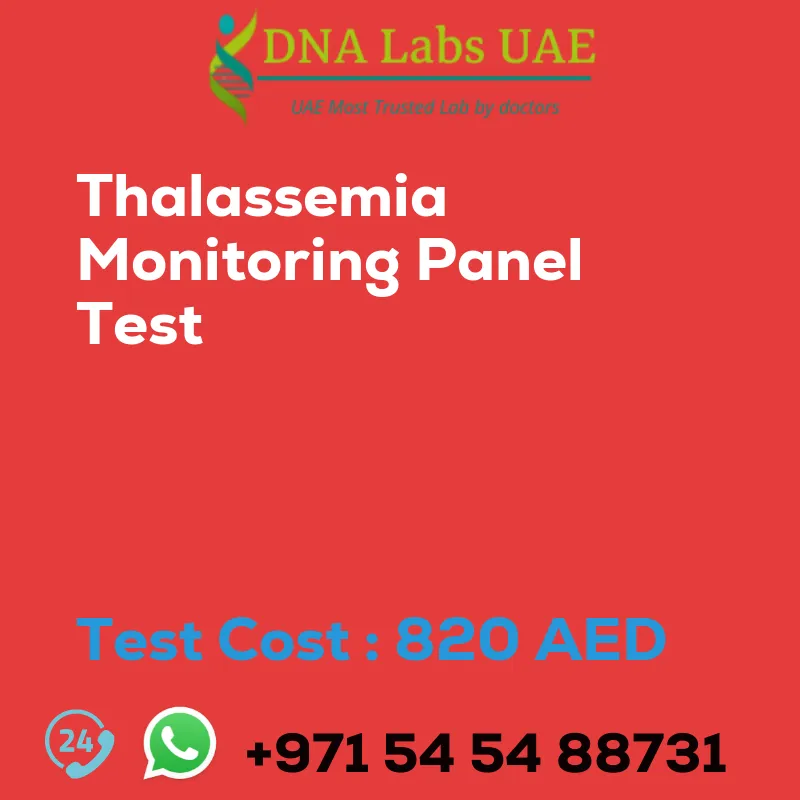Thalassemia Monitoring Panel Test
At DNA Labs UAE, we offer the Thalassemia Monitoring Panel test, a diagnostic tool used to assess and monitor individuals with thalassemia. Thalassemia is a group of genetic blood disorders that affect the production of hemoglobin. This panel includes several tests that provide important information about the type and severity of thalassemia, as well as the effectiveness of treatment.
Test Components
- Z021: Complete Blood Count (CBC)
- H060: Ferritin
- B032: SGOT; Aspartate Aminotransferase (AST)
- B033: SGPT; Alanine Aminotransferase (ALT)
- B023: Creatinine, Serum
- B022: BUN; Blood Ureanitrogen
- B042: Calcium, Serum
- B043: Phosphorus, Serum
- B001: Glucose Fasting (F)
- R052: TSH (Thyroid Stimulating Hormone)
- S057: Hepatitis B Surface Antibody; Anti HBs
- S010: HIV 1 & 2 Antibodies, Screening Test
- S062: Hepatitis C Antibody (Anti-HCV)
Test Cost
The cost of the Thalassemia Monitoring Panel test is AED 820.0.
Symptoms and Diagnosis
Thalassemia can cause symptoms such as fatigue, weakness, pale skin, and shortness of breath. Diagnosis of thalassemia is typically made through a combination of physical examination, medical history, and laboratory tests, including the Thalassemia Monitoring Panel.
Sample Condition
The Thalassemia Monitoring Panel test requires a 3 mL (2 mL minimum) serum sample from 1 SST and 2 mL (1 mL minimum) plasma samples from 1 Grey Top (Sodium Fluoride) tube. Additionally, a 2 mL (1 mL minimum) plasma sample from 1 Lavender Top (EDTA) tube is required. The samples should be shipped refrigerated or frozen. It is important to note that hemolysed specimens are not acceptable. A duly filled Consent form for HIV testing & Pre-test counselling (Form 10 & 10A) is mandatory.
Report Delivery
The report for the Thalassemia Monitoring Panel test is delivered daily.
Method
The Thalassemia Monitoring Panel test utilizes electrical impedance, VCS spectrophotometry, and CLIA (Chemiluminescent Immunoassay) methods.
Test Type
The Thalassemia Monitoring Panel test falls under the category of Blood Disorders.
Doctor
This test is performed by a Hematologist.
Test Department
The Thalassemia Monitoring Panel test is conducted in our dedicated Test Department.
Pre Test Information
Minimum 8 hours fasting is mandatory before undergoing the Thalassemia Monitoring Panel test. Additionally, a duly filled Consent form for HIV testing & Pre-test counselling (Form 10 & 10A) is mandatory.
Test Details
The Thalassemia Monitoring Panel test includes several important tests:
- Complete Blood Count (CBC): This test measures the levels of red blood cells, white blood cells, and platelets in the blood. It can help identify anemia and determine the severity of thalassemia.
- Hemoglobin Electrophoresis: This test separates different types of hemoglobin based on their electrical charge. It can identify abnormal hemoglobin variants, such as hemoglobin S (found in sickle cell anemia) or hemoglobin E (found in certain types of thalassemia).
- Iron Studies: These tests measure the levels of iron in the blood, as well as other markers of iron metabolism. They can help determine if iron overload is present, which can occur in individuals who receive frequent blood transfusions to treat thalassemia.
- Serum Ferritin: This test measures the levels of ferritin, a protein that stores iron in the body. Elevated ferritin levels can indicate iron overload.
- Genetic Testing: This test involves analyzing the individual’s DNA to identify specific genetic mutations associated with thalassemia. It can help confirm the diagnosis and determine the specific type and severity of thalassemia.
The results of the Thalassemia Monitoring Panel test are crucial in guiding treatment decisions and monitoring the effectiveness of interventions such as blood transfusions, iron chelation therapy, or bone marrow transplantation. Regular monitoring is essential to ensure optimal management of thalassemia and prevent complications associated with the disorder.
| Test Name | THALASSEMIA MONITORING PANEL Test |
|---|---|
| Components | *Z021* COMPLETE BLOOD COUNT;CBC *H060* FERRITIN *B032* SGOT; ASPARTATE AMINOTRANSFERASE (AST) *B033* SGPT; ALANINE AMINOTRANSFERASE (ALT) *B023* CREATININE,SERUM *B022* BUN; BLOOD UREANITROGEN *B042* CALCIUM,SERUM *B043* PHOSPHORUS,SERUM *B001* GLUCOSEFASTING (F) *R052* TSH (THYROID STIMULATING HORMONE) *S057* HEPATITIS B SURFACE ANTIBODY; ANTI HBs *S010* HIV 1 & 2 ANTIBODIES, SCREENING TEST *S062* HEPATITIS C ANTIBODY (Anti-HCV) |
| Price | 820.0 AED |
| Sample Condition | 3 mL (2 mL min.) serum from 1 SST AND 2 mL (1 mL min.) plasma from 1 Grey Top (Sodium Fluoride) tube. Ship refrigerated or frozen AND 2 mL (1 mL min.) plasma from 1 Lavender Top (EDTA) tube. Ship refrigerated. DO NOT FREEZE. Minimum 8 hours fasting is mandatory. Hemolysed specimensarenotacceptable. Duly filled Consent form for HIV testing & Pre-test counselling (Form 10 & 10A) is mandatory.. |
| Report Delivery | Daily |
| Method | Electrical Impedance, VCS Spectrophotometry ,CLIA |
| Test type | Blood Disorders |
| Doctor | Hematologist |
| Test Department: | |
| Pre Test Information | Minimum 8 hours fasting is mandatory. Duly filled Consent form for HIV testing & Pre-test counselling (Form 10 & 10A) is mandatory. |
| Test Details |
The Thalassemia Monitoring Panel test is a diagnostic tool used to assess and monitor individuals with thalassemia, a group of genetic blood disorders that affect the production of hemoglobin. This panel includes several tests that provide important information about the type and severity of thalassemia, as well as the effectiveness of treatment. The Thalassemia Monitoring Panel typically includes the following tests: 1. Complete Blood Count (CBC): This test measures the levels of red blood cells, white blood cells, and platelets in the blood. It can help identify anemia and determine the severity of thalassemia. 2. Hemoglobin Electrophoresis: This test separates different types of hemoglobin based on their electrical charge. It can identify abnormal hemoglobin variants, such as hemoglobin S (found in sickle cell anemia) or hemoglobin E (found in certain types of thalassemia). 3. Iron Studies: These tests measure the levels of iron in the blood, as well as other markers of iron metabolism. They can help determine if iron overload is present, which can occur in individuals who receive frequent blood transfusions to treat thalassemia. 4. Serum Ferritin: This test measures the levels of ferritin, a protein that stores iron in the body. Elevated ferritin levels can indicate iron overload. 5. Genetic Testing: This test involves analyzing the individual’s DNA to identify specific genetic mutations associated with thalassemia. It can help confirm the diagnosis and determine the specific type and severity of thalassemia. The results of the Thalassemia Monitoring Panel test can guide treatment decisions and help healthcare providers monitor the effectiveness of interventions such as blood transfusions, iron chelation therapy, or bone marrow transplantation. Regular monitoring is essential to ensure optimal management of thalassemia and prevent complications associated with the disorder. |








